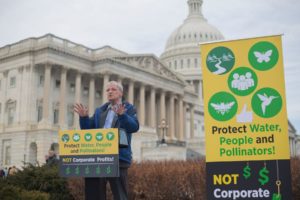16
Feb
Saving America’s Pollinators Act To Be Reintroduced in Congress

U.S. Rep. Earl Blumenauer (D-OR) discussing Saving America’s Pollinators Act.
(Beyond Pesticides, February 16, 2018) U.S. Representatives Blumenauer (D-OR) and Jim McGovern (D-MA) this week announced plans to reintroduce the Saving America’s Pollinators Act, (previously H.R. 3040) which suspends the registration of certain neonicotinoid insecticides until the U.S. Environmental Protection Agency conducts a full scientific review that ensures these chemicals do not harm pollinators. Beyond Pesticides joined Rep. Blumenauer and other experts from environmental, conservation, whistleblower and farmworker health groups on Capitol Hill to urge Congress to take action to protect pollinators in the face of ongoing obstruction by an increasingly industry-influenced EPA.
“Pollinators are the backbone of America’s agriculture system. Acting now to protect them and stop their decline is essential to the sustainability of our nation’s food supply,” Rep. McGovern said. “Simply taking the word of the manufacturers that their products are safe is not an option. Consumers need strong oversight. That is why I am proud to join Congressman Blumenauer in demanding the EPA fully investigate the effect that certain harmful pesticides may have on the vitality of our pollinators.”
Numerous scientific studies implicate neonicotinoid pesticides as key contributors to the global decline of pollinator populations. EPA’s own scientists have found that neonicotinoids pose far-reaching risks to birds and aquatic invertebrates. Last week, at the request of industry, EPA extended its comment period on preliminary ecological and human health risk assessments for the neonicotinoids clothianidin, thiamethoxam and dinotefuran, and a preliminary ecological risk assessment for the neonicotinoid imidacloprid. EPA’s risk assessments find deadly impacts to birds from neonicotinoid-treated seeds, poisoned insect prey, and contaminated grasses.
“EPA’s recent assessment confirms what the science has already shown: that neonicotinoids are highly toxic not just to bees, but to aquatic species and birds. To protect our waterways and pollinators it is imperative that action be taken to ban these chemicals,” said Nichelle Harriott, science and regulatory director at Beyond Pesticides.
University researchers have found that tiny amounts of neonicotinoids are enough to cause migrating songbirds to lose their sense of direction and become emaciated. A recent study by U.S. Geological Survey (USGS) researchers found neonics widespread in the Great Lakes at levels that harm aquatic insects, or the aquatic food web—the foundation of healthy aquatic ecosystems.
“The health of our food system depends on the health of our pollinators. The status quo is like flying blind – we shouldn’t be using these pesticides when we don’t know their full impact,” said Rep. Blumenauer. “The EPA has a responsibility to get to the bottom of this issue and protect pollinators.”
Canada’s pesticide regulatory agency has recommended banning the most widely used neonicotinoid, imidacloprid, based on harms to aquatic ecosystems. Europe has instituted a temporary ban on neonicotinoids based on their harms to pollinators, and the European Commission recently proposed extending the ban indefinitely and eliminating all agricultural uses of the chemicals.
Given the ongoing obstruction by EPA leadership, however, Representatives Blumenauer and McGovern are offering a legislative remedy to address the national pollinator crisis. But Congress won’t act unless members hear from their constituents. Help push EPA to take substantive action on neonicotinoids by urging your Representative to support the Saving America’s Pollinators Act. With managed honey bee losses remaining at unsustainable levels and many wild pollinators at risk of extinction (1, 2, 3), it’s time, for the future of food and our environment, for the U.S. to finally protect pollinators.
Source: Representative Blumenauer Press Release
All unattributed positions and opinions in this piece are those of Beyond Pesticides.










